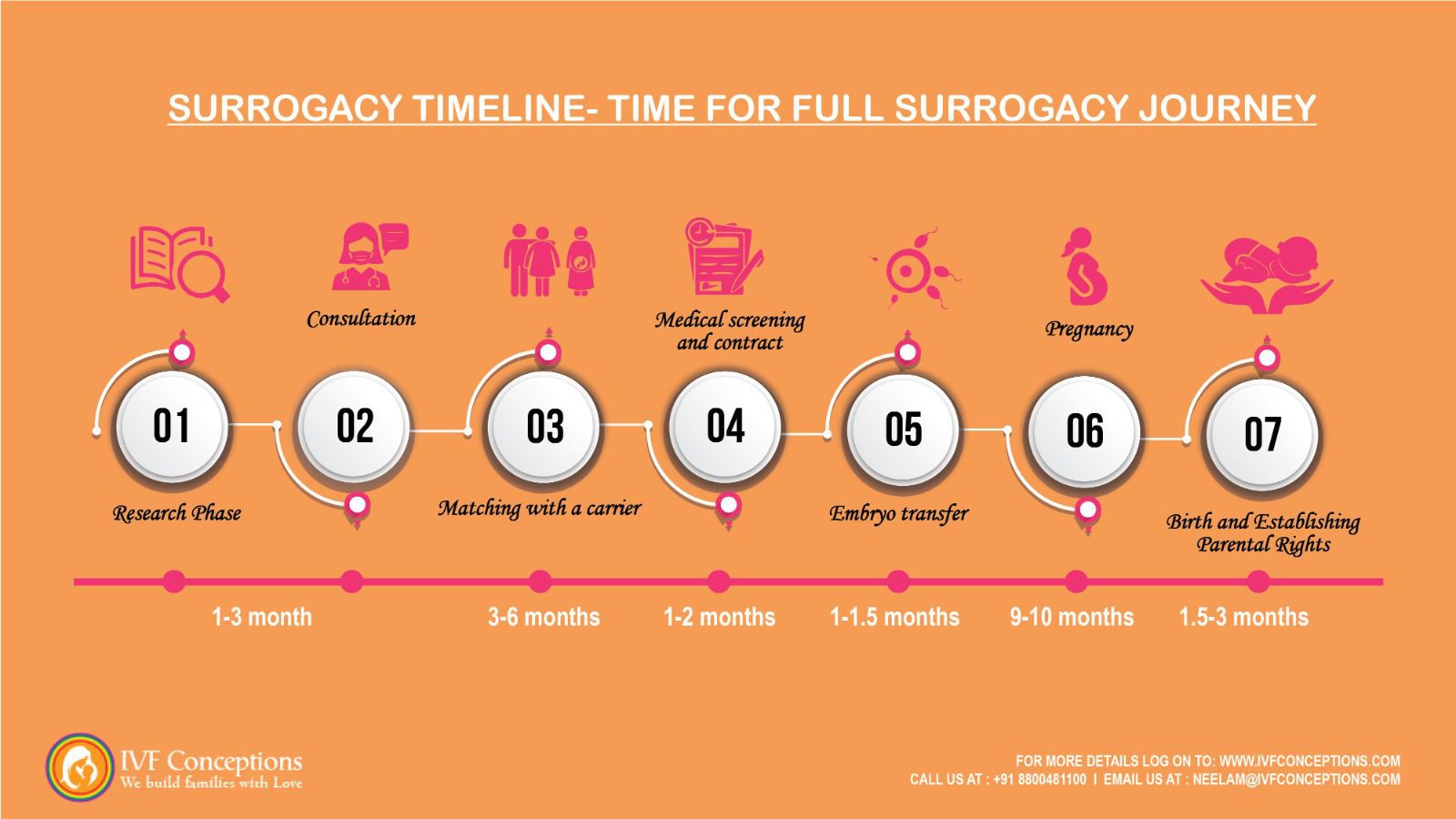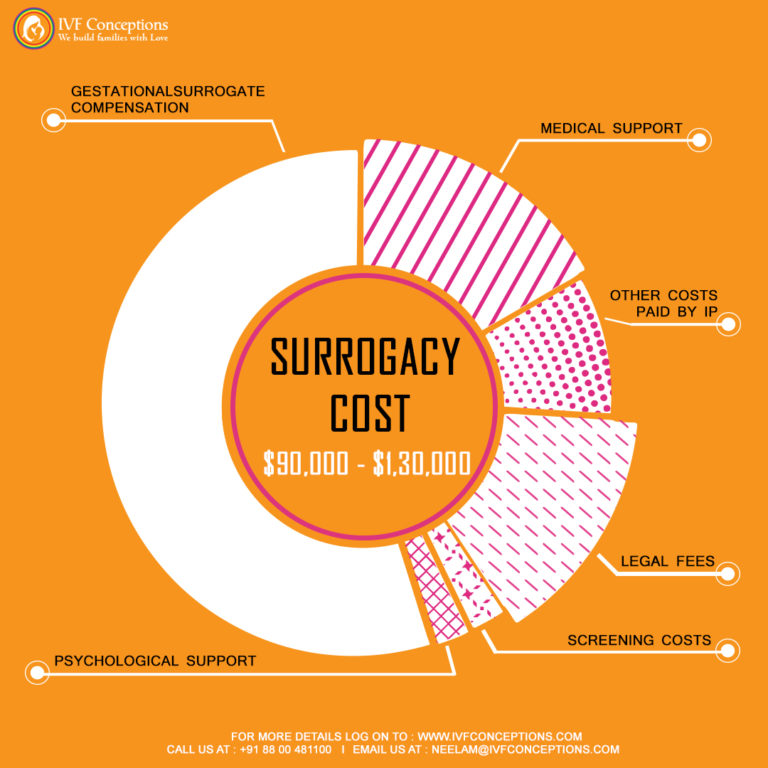The Comprehensive Guide to Surrogate Mothers| Surrogate Mother Cost| Surrogacy Process

Surrogacy, a process that allows intended parents to have a baby through a surrogate mother, has garnered both interest and controversy. This comprehensive guide aims to provide you with all the information you need to know about surrogate mothers and the surrogacy process.
From understanding the different types of surrogates to finding the right surrogate for your unique situation, we will explore the intricate details of this remarkable journey.
Additional Guides for Surrogate Mother:
Find a Surrogate Mother With or Without an Agency
In Which Country I Find Low-Cost Surrogate Mothers (in 2023)?
How can I Find a Surrogate Without Agency
What is the Age Limit for Surrogate Mothers
How Much Does Surrogacy Cost Using Family Member
How to Start the Gestational Surrogacy Process? A step-by-step guide for Beginners
How Much Does Surrogacy Cost? Everything You Need To Know (in 2023)
What Is a Surrogate Mother?
Surrogate Mother Meaning: A surrogate mother is someone who carries and gives birth to a child for another person or couple. The surrogate mother may be the child’s genetic mother (the egg donor), or she may have no biological relationship with the child. Surrogacy arrangements are made through fertility clinics or third-party agencies, and the parties involved must sign legal contracts.
In the U.S., the first successful surrogacy arrangement occurred in 1985. Since then, surrogacy has become an increasingly popular option for couples who are unable to have a child on their own.
Surrogate or gestational surrogacy is the mother of a surrogacy baby, however, the baby is not genetically linked with the baby.
How does a surrogate mother get pregnant?
A surrogate mother is a woman who carries a child on behalf of the intended parents and agrees to give birth to the baby, relinquishing parental rights to them. The surrogate baby is biologically related to the commissioning parents and belongs to them only.
There are two primary types of surrogate mothers:
- Traditional Surrogate: In traditional surrogacy, the surrogate mother is artificially inseminated with the father’s sperm. As a result, she becomes the biological mother of the child since it was her egg that was fertilized. In some cases, donor sperm can also be used. Here, she is genetically related to the baby.
- Gestational Surrogate: Gestational surrogacy involves a more complex process called “in vitro fertilization” (IVF process). The eggs are gathered either from the intended mother or an egg donor, fertilized with sperm from the intended father or a sperm donor, and the resulting embryo is implanted into the uterus of the gestational surrogate.
Get in touch for a Free Surrogacy Consultancy:
📲 +91-8800481100 ( WhatsApp, Line, Viber)
Benefits of Becoming a Surrogate
There are many benefits to becoming a surrogate mother.
- For one, you can help create a beautiful life for someone who may not be able to have children of their own.
- Additionally, you can earn a significant amount of money for your time and efforts.
- Finally, you can feel an immense sense of satisfaction and pride knowing that you have helped bring new life into the world.
If you are considering becoming a surrogate mother, there are a few things you should know. First and foremost, you must be in good physical health. You will also need to undergo a psychological evaluation to ensure that you are emotionally capable of handling the surrogacy process. Additionally, you will need to have a supportive network of family and friends who are willing to help you through this journey.
Understanding Surrogate Motherhood
A surrogate mother, also known as a surrogate, gestational surrogate, or gestational carrier, is a woman who willingly decides to carry and give birth to a child on behalf of an intended family.
These selfless individuals embrace the profound responsibility of helping others realize their dream of becoming parents.
Surrogacy arrangements come in various forms, but in gestational surrogacy, the surrogate is not genetically related to the child she carries.
Surrogate Mother Qualifications and Characteristics
The process of selecting a suitable surrogate mother is meticulous, involving several criteria that ensure a safe and smooth journey for both the surrogate and the intended parents.
Reputable surrogacy agencies can help you find the ideal surrogate mother for you. The qualifications and characteristics typically sought in a surrogate mother include:
- Successful Pregnancy History: Surrogates should have a track record of previous pregnancies without complications, demonstrating their ability to carry a child to term successfully.
- Parenting Experience: Many surrogacy agencies prefer surrogates who are already raising at least one child at home, as this indicates their experience and commitment to parenthood.
- Health and Background Checks: Surrogates undergo rigorous background checks, criminal record checks, and psychological evaluations to ensure their suitability for the process.
- Physical and Emotional Health: A clean bill of health from a medical professional is essential to ensure that the surrogate is physically and emotionally prepared for the journey ahead.

The Motivations of Surrogate Mothers
The decision to become a surrogate mother is deeply personal and driven by a myriad of motivations.
Some surrogates are inspired by the desire to help others experience the joys of parenthood, knowing the profound impact it can have on a family’s life.
For others, surrogacy is an opportunity to cherish the pregnancy experience, as they genuinely enjoy being pregnant and wish to share this gift with those in need.
While financial compensation may be a factor, most surrogates find immense fulfillment in the altruistic nature of their journey. If you wish to apply to become a surrogate, contact us.
Who Uses Surrogates?
Various individuals and couples turn to surrogacy for different reasons. Some common scenarios where surrogacy might be considered include:
- Medical Problems: Women with medical conditions that make pregnancy impossible or risky for them, such as uterine problems or severe heart disease, may opt for surrogacy.
- Hysterectomy: Women who have had a hysterectomy, where their uterus has been removed, can explore surrogacy as an alternative to carrying a child.
- Infertility: Couples who have experienced fertility problems despite attempting various assisted-reproduction techniques, such as IVF, may consider surrogacy.
- Same-Sex Couples: Same-sex male couples can choose either traditional surrogacy, where one partner’s sperm is used for artificial insemination, or gestational surrogacy, where a donor egg is fertilized and implanted in the gestational surrogate.
- Single Individuals: Surrogacy also provides an opportunity for single individuals who desire to become parents.
Finding a Surrogate Mother
When looking for a surrogate mother, several options are available:
- Friends or Family: Some individuals may consider asking a friend or relative to be their surrogate. This option, though somewhat controversial, maybe more manageable due to the existing trust and familiarity.
- Surrogacy Agencies: Surrogacy agencies act as intermediaries between intended parents and potential surrogates. These agencies help match intended parents with suitable surrogates and assist with legal and financial arrangements. Approximately 100 agencies operate in the U.S. to facilitate gestational surrogacy.
- Online Search: In this time of social media there are many online surrogate groups, forums, and websites where IPs can find surrogate mothers. However, it is advised to be cautious when opting for such options.

How to Choose a Surrogate-
Surrogate mothers must meet all requirements as needed by the surrogacy agency and intended parents. Selecting the right surrogate is a crucial step in the surrogacy process. Surrogate requirements to consider when choosing a surrogate mother:
- Age and Experience: Experts recommend choosing surrogates who are at least 21 years old and have previously given birth to a healthy baby. This ensures they understand the medical risks and emotional aspects of pregnancy and childbirth.
- Psychological Screening: Surrogates should undergo a psychological screening by a mental health professional to assess their emotional readiness to give up the baby after birth.
- Legal Contract: Before proceeding, a clear and comprehensive legal contract should be established outlining the surrogate’s role and responsibilities during pregnancy, including prenatal care and the agreement to surrender the baby after birth.
Medical Considerations
Surrogates should undergo a thorough medical examination to ensure they are fit for a healthy, full-term pregnancy. The American Society for Reproductive Medicine suggests testing for infectious diseases like syphilis, gonorrhea, chlamydia, HIV, cytomegalovirus, and hepatitis B and C. Surrogates should also be tested for immunity to measles, rubella (German measles), and chickenpox.
Learn more about surrogates:
Surrogacy process step-by-step
International surrogacy options
Surrogacy meaning and surrogacy definition

The Gestational Surrogacy Process- Surrogate mother process
The gestational surrogacy process involves in vitro fertilization (IVF), where an embryo is created using either the intended parent’s sperm and egg, donor egg and intended father’s sperm, donor sperm and intended mother’s egg, donor sperm and egg, or a donated embryo from a previous IVF procedure.
The selected embryo is then transferred into the uterus of the surrogate mother, who will carry the pregnancy to term.
The surrogate is the mother of surrogate baby and just a carrier of the baby for the intended parents.
A common concern among those considering surrogacy is whether the baby will be genetically related to the surrogate mother. It is important to clarify that in gestational surrogacy, the baby is not biologically related to the surrogate, as the embryo is derived from the genetic material of the intended parents or donors.

The Cost of Surrogacy Process
Surrogacy is a significant financial commitment, and the cost can range from $150,000 to $200,000. Several factors influence the overall expenses, such as whether the surrogate has her medical insurance and whether a surrogacy-pregnancy policy needs to be purchased.
Understanding the Cost of Surrogacy:
While the cost of surrogacy can be a significant investment, understanding the various components, exploring financing options, and managing expenses can make the journey to parenthood through surrogacy more achievable.
Surrogacy Agency Fees: Surrogacy agencies facilitate the matching process between intended parents and surrogates. Agency fees cover administrative costs, background checks, and support services throughout the journey.
Surrogate Compensation: Compensation for the surrogate includes base pay, allowances, and potential bonuses. The compensation may vary based on the surrogate’s experience and the type of surrogacy.
Medical Expenses: Medical costs involve the IVF procedure, prenatal care, delivery, and any medical interventions required during the surrogacy process.
Surrogacy involves complex legal procedures, including drafting contracts and establishing parental
Legal Fees: rights. Legal fees cover the services of attorneys and court filings.
Additional Costs: This category includes travel expenses, accommodation, and other miscellaneous costs related to the surrogacy journey.
The average cost of surrogacy in the USA is in the range of $150,000 to $200,000 in the USA. For International surrogacy countries, the cost varies from $60,000 to $80,000.
Surrogate Mother Pay: The cost of Surrogate Mother
Several factors come into play when determining surrogate mother compensation. These factors can vary depending on the surrogacy agency or the intended parents’ preferences, but some common considerations include:
- Location: Compensation may differ based on the cost of living in the surrogate’s region or country.
- Experience: Experienced surrogates who have successfully completed previous surrogacy journeys may receive higher pay.
- Terms in surrogacy agreement: The detail of surrogacy terms and conditions including financial obligation are an important part of the surrogacy agreement.
Surrogate mother pay refers to the financial compensation that gestational carriers receive for their commitment and dedication throughout the surrogacy journey. It is important to note that surrogacy is a significant and selfless decision for a woman to undertake, and the compensation serves as recognition for her time, effort, and sacrifice. Typical surrogate mother compensation range from $35,000 to $65,000.
The compensation covers various aspects, including:
Base Compensation: A fixed amount paid to the surrogate for her services.
Medical Expenses: All medical costs related to the surrogacy process are covered by the intended parents or their insurance.
Monthly Allowance: Surrogates may receive a monthly allowance to cover expenses during the pregnancy.
Lost Wages: Surrogates are compensated for any income lost due to the surrogacy journey.

Legal Issues with Surrogacy
The legal landscape of surrogacy varies from state to state in the United States, with no federal law governing the process. Parental rights after a surrogate pregnancy may not be guaranteed, and legal custody of the child may require adoption proceedings in some states. In contrast, other states may recognize a “declaration of parentage” before birth, avoiding the need for additional adoption procedures.
To safeguard the rights of the intended parents and the child, it is vital to engage an attorney specializing in reproductive law to draft a comprehensive surrogacy contract that addresses various scenarios and potential legal issues.
Learn more about the surrogacy process:
Pros and cons of traditional surrogacy
Finding a surrogate mother through a friend
How to choose the right surrogate agency
The medical screening process for surrogates
Cost-effective surrogacy options- Affordable surrogacy made possible
Cheap surrogacy countries for surrogacy
Legal rights of intended parents in surrogacy
Risks of surrogacy pregnancy for the surrogate
Conclusion: Who is Surrogate Mother
The journey of surrogacy is one that requires thoughtful consideration, extensive research, and careful planning. It is most important to choose the best surrogacy agency which is experienced, professional, and ethical in an approach like leading surrogacy consulting like IVF Conceptions.
Get in touch for a Free Surrogacy Consultancy:
📲 +91-8800481100 ( WhatsApp, Line, Viber)

Frequently asked questions about the surrogate meaning and definition:
1. What is the role of a surrogate mother?
The role of a surrogate mother is to carry a pregnancy on behalf of another person or couple who cannot conceive or carry a child themselves.
Surrogates undergo medical procedures, including artificial insemination or in vitro fertilization (IVF), to become pregnant with an embryo created from the intended parents’ or donors’ genetic material.
Throughout the pregnancy, the surrogate takes care of the baby until birth and then relinquishes parental rights to the intended parents.
2. How does surrogacy work?
Surrogacy involves two primary methods: traditional surrogacy and gestational surrogacy.
In traditional surrogacy, the surrogate’s own egg is fertilized with the intended father’s sperm through artificial insemination. The surrogate becomes the biological mother of the child.
In gestational surrogacy, the embryo is created using the intended parents’ or donors’ genetic material through IVF. The embryo is then transferred to the gestational surrogate’s uterus, which carries the baby to term.
3. What are the different types of surrogate mothers?
There are two main types of surrogate mothers: traditional surrogates and gestational surrogates. A traditional surrogate uses her own egg, making her the biological mother of the child.
On the other hand, a gestational surrogate carries an embryo created using the genetic material of the intended parents or donors, making her the “birth mother,” but not the biological mother.
4. What is the legal process involved in surrogacy?
The legal process of surrogacy varies from state to state and country to country. It involves drafting a surrogacy agreement that outlines the rights and responsibilities of the surrogate, intended parents, and any donors involved.
Legal representation is crucial to ensure that all parties’ rights are protected, and parental rights are established after birth.
5. Who typically uses surrogate mothers?
Various individuals and couples use surrogate mothers for different reasons.
Women with medical conditions that prevent them from carrying a pregnancy, those who have undergone a hysterectomy, or those with conditions that make pregnancy risky may opt for surrogacy. Additionally, LGBTQ+ couples and single individuals who cannot conceive naturally or through other assisted reproduction techniques (ART) may also choose surrogacy.
6. How can someone find a surrogate mother?
There are two common ways to find a surrogate mother. One is through personal connections, where a friend or family member volunteers to be a surrogate. The other method involves working with a surrogacy agency, which acts as an intermediary to match intended parents with suitable surrogates. Agencies handle the legal and logistical aspects of the surrogacy process.
7. What are the costs associated with surrogacy?
Surrogacy can be a costly process, and the expenses may vary depending on various factors. The costs typically include agency fees, medical expenses for the surrogate, legal fees, and compensation for the surrogate’s time and effort. On average, surrogacy can range from $150,000 to $200,000.
8. Are there any risks involved in the surrogacy process?
Like any medical procedure, surrogacy carries certain risks and uncertainties. Some potential risks include medical complications during pregnancy, emotional challenges for both the surrogate and intended parents, and legal complexities related to parental rights and custody.
However, with proper medical and legal support, many of these risks can be mitigated.
9. How can intended parents protect their rights in surrogacy?
To protect their rights as intended parents, it is crucial for individuals or couples considering surrogacy to work with an experienced reproductive law attorney.
The attorney can help draft a comprehensive surrogacy contract that outlines the rights, responsibilities, and expectations of all parties involved.
This contract can provide legal protection and clarity throughout the surrogacy journey, ensuring a smooth and secure process.
If you’d like to learn more about IVF, Egg Donation, or surrogacy services globally, check out the rest of our website at IVF Conceptions. We offer legally secure and affordable surrogacy consulting services for FREE.
References: Used:
Infertility and Reproduction Guide
ASRM


